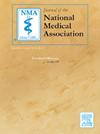Empower, Educate, Lead: Developing Health Equity Leaders in Military Medicine
IF 2.3
4区 医学
Q1 MEDICINE, GENERAL & INTERNAL
引用次数: 0
Abstract
Introduction
Despite growing recognition of health equity’s importance in healthcare and medical education, many educators struggle to lead discussions on topics like implicit bias, racism, cultural humility, and structural competency. Hesitation often stems from limited experience and the sensitive nature of these conversations. At our institution, this challenge was addressed through mentorship from senior health professions education (HPE) and health equity experts. After implementing an introductory and longitudinal case-based health equity curriculum tailored to our military medicine patient population, interest grew from other military hospitals seeking to adopt our approach. This led to the development of a 2-year “Train New Trainers” program, supported by the AAIM Building Trust Grant, to expand health equity education across military residency programs.
Our initiative aimed to scale our “Health Equity Rounds” curriculum—which includes introductory modules and case-based content— across military Internal Medicine residency programs. Recognizing the unique healthcare needs within the Military Health System, the program focuses on equipping military physicians to address healthcare bias, racism, cultural humility, and structural competency to provide more equitable care.
Results to Date
In June 2024, 22 representatives from U.S. military Internal Medicine residency programs attended our 5-day training seminar. Participants rated their pre-training ability to teach health equity as low (1.47/5), with significant improvement post-training (3.90/5, p < 0.001, Cohen’s D = 2.62). Qualitative feedback highlighted key benefits, including improved understanding of equity concepts, enhanced facilitation skills, and personal growth in cultural humility.
Challenges identified by participants included personal confidence, managing difficult questions, institutional buy-in, and time constraints. Participants requested ongoing support through a community network, continued institutional advocacy, and access to teaching resources like health disparities research and debriefing spaces.
Lessons Learned
A major barrier to integrating health equity into medical education is educators' discomfort addressing sensitive topics. Our Train New Trainers initiative helped build confidence and skills, demonstrating that case-based learning tailored to military patient populations fosters engagement. While the training successfully increased teaching confidence, continued support is vital while our participants implement this curriculum over the next year. Future efforts should focus on building a community of practice, offering mentorship, and addressing institutional barriers like time limitations and leadership buy-in. Supporting participants in integrating health equity work into their academic portfolios through research and scholarship will also further sustain program impact.
授权、教育、领导:在军事医学中培养健康公平的领导者
尽管越来越多的人认识到健康公平在医疗保健和医学教育中的重要性,但许多教育工作者仍在努力引导有关隐性偏见、种族主义、文化谦逊和结构能力等主题的讨论。犹豫往往源于有限的经验和这些谈话的敏感性质。在我们机构,这一挑战是通过高级卫生专业教育(HPE)和卫生公平专家的指导来解决的。在实施了为我们的军队医疗患者量身定制的介绍性和纵向案例卫生公平课程后,其他军队医院寻求采用我们的方法的兴趣越来越大。这促成了一项为期两年的“培训新培训师”项目的发展,该项目由AAIM建设信托基金提供支持,旨在扩大医疗公平教育在军事住院医师项目中的应用。我们的计划旨在扩大我们的“健康公平回合”课程——包括介绍模块和基于案例的内容——在军队内科住院医师项目中推广。认识到军队卫生系统中独特的医疗保健需求,该项目侧重于为军队医生提供装备,以解决医疗偏见、种族主义、文化谦逊和结构能力问题,以提供更公平的医疗服务。2024年6月,22名来自美国军方内科住院医师项目的代表参加了我们为期5天的培训研讨会。参与者认为他们在训练前教授健康公平的能力较低(1.47/5),训练后显著提高(3.90/5,p < 0.001, Cohen 's D = 2.62)。定性反馈强调了主要的好处,包括提高对公平概念的理解,提高促进技能,以及在文化谦逊方面的个人成长。参与者确定的挑战包括个人信心、管理难题、机构支持和时间限制。与会者要求通过社区网络提供持续支持,继续进行机构宣传,并获得健康差异研究和汇报空间等教学资源。将健康公平纳入医学教育的一个主要障碍是教育工作者在处理敏感话题时感到不自在。我们的“培训新培训师”计划帮助建立了信心和技能,证明了为军队患者群体量身定制的基于案例的学习促进了参与。虽然培训成功地提高了教学信心,但在我们的参与者在明年实施该课程时,持续的支持至关重要。未来的努力应侧重于建立一个实践社区,提供指导,并解决时间限制和领导力认同等制度障碍。通过研究和奖学金,支持参与者将卫生公平工作纳入其学术组合,也将进一步维持项目的影响。
本文章由计算机程序翻译,如有差异,请以英文原文为准。
求助全文
约1分钟内获得全文
求助全文
来源期刊
CiteScore
4.80
自引率
3.00%
发文量
139
审稿时长
98 days
期刊介绍:
Journal of the National Medical Association, the official journal of the National Medical Association, is a peer-reviewed publication whose purpose is to address medical care disparities of persons of African descent.
The Journal of the National Medical Association is focused on specialized clinical research activities related to the health problems of African Americans and other minority groups. Special emphasis is placed on the application of medical science to improve the healthcare of underserved populations both in the United States and abroad. The Journal has the following objectives: (1) to expand the base of original peer-reviewed literature and the quality of that research on the topic of minority health; (2) to provide greater dissemination of this research; (3) to offer appropriate and timely recognition of the significant contributions of physicians who serve these populations; and (4) to promote engagement by member and non-member physicians in the overall goals and objectives of the National Medical Association.

 求助内容:
求助内容: 应助结果提醒方式:
应助结果提醒方式:


